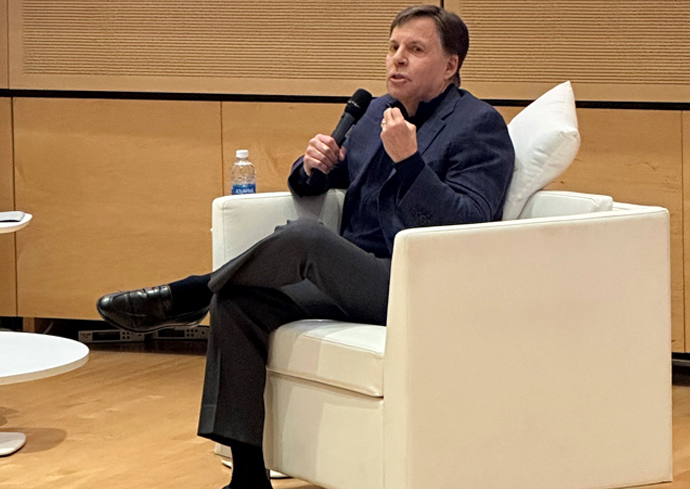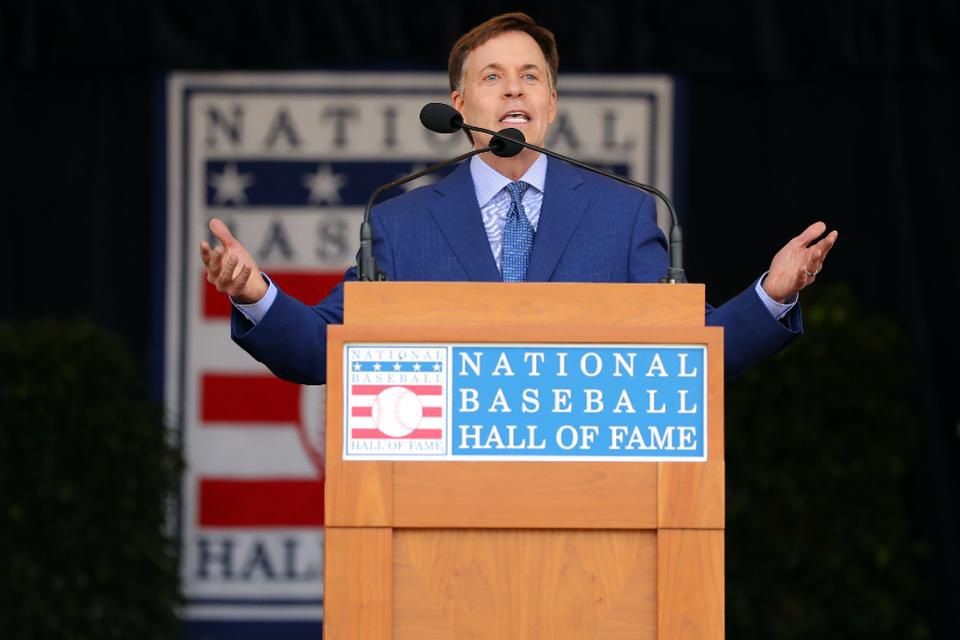Broadcasting Legend Bob Costas ’74 Shares Tips, Stories From Hall of Fame Sportscasting Career
Even Bob Costas ’74 can strike out occasionally in the broadcast booth.
During an appearance Friday at the S.I. Newhouse School of Public Communications, the decorated sportscaster shared a story from his iconic career about a regrettable mistake that he turned into a teachable moment for the students who packed the Joyce Hergenhan Auditorium for the Leaders in Communications lecture series.

The Chicago Cubs were taking on the St. Louis Cardinals on June 28, 2015, and Cubs pitcher Pedro Strop had an outing to forget, allowing a home run, hitting a batter and walking a batter in a disastrous relief effort. As he walked off the mound, Strop pointed to the sky, a trademark gesture for the reliever. Costas admits he’s not a fan of athletes celebrating when their performance is substandard, and he wanted to poke a little fun at Strop during his MLB Network broadcast.
Problem was, Costas didn’t have as much time as he anticipated going into the commercial break, and he was forced to cut off his remarks quickly.
“Strop is on his way out, pointing toward the heavens. We can only ask — or wonder — that he is asking some departed relative for forgiveness for this atrocious performance,” Costas said at the time, words he would later regret as the moment went viral on Twitter.
Two days later, the remorseful Costas approached Strop in the team’s hotel lobby in St. Louis, delivering a heartfelt apology. Strop knew Costas made a mistake and appreciated the Major League Baseball Hall of Famer speaking to him in person.
“My producer told me Twitter was blowing up over this, and usually if Twitter is blowing up, I’m okay with it,” says Costas, 71, who stays off social media.
“But I wasn’t okay with it. I rewatched the clip and it was even worse than I thought. But if Twitter did not exist. If somehow, I had done this in 1990, I would have done the same thing. … We were bonded by this goofy incident, where I admitted that I stepped in it. That’s the way you handle a screwup. Not a big to-do online, but you look the person in the eyes and admit you screwed up.”
A Deep Love and Appreciation for Language
Costas’ career highlights include winning 29 Emmy Awards, covering 12 Olympics and calling or hosting multiple World Series, Super Bowls and NBA Finals.
Open to current Newhouse students, including those studying broadcast and digital journalism, the two-hour program featured video clips from Costas’ career and a question-and-answer segment.
Costas encouraged students to be well-read— “not just for the knowledge, but to appreciate the language, learn how to turn a phrase and appreciate the beauty of prose”—lamented the rise of sports hot takes—when commentators and analysts shout an attention-grabbing opinion over each other in an attempt to go viral on social media—and shared how he’s been blessed with a vivid memory and quick recall that allows him to write his broadcast copy directly out of his head as he’s thinking it.
The WAER Hall of Famer still calls baseball games and makes appearances on MLB Network and CNN, and hosts “Back On the Record With Bob Costas” on HBO.

“Thank goodness I can because I have no other discernible talents. Things everyone else can do like fix a flat tire or screw in a light bulb, I can’t do at all. But I’m pretty good verbally and I always liked the English language,” says Costas, who mixed in self-deprecating remarks and showed he’s not afraid to make fun of himself during the program.
“When you’re broadcasting a game, the respect for knowledge and pacing isn’t just what you say, it’s how you say and write your copy.”
Speaking Truth to the Sports Powers-That-Be
Costas has not shied away from calling out hypocrisy in the sports landscape and speaking truth to the powerful sports organizations during his career.

Among the incidents that drew harsh commentary from Costas: corruption in the International Olympic Committee (IOC) and how the IOC often awarded the Olympics to countries with either dubious records on human rights issues or leaders with a checkered past; the NFL’s longstanding refusal to admit players were suffering from concussions and chronic traumatic encephalopathy (CTE), a progressive and fatal brain disease associated with repeated traumatic brain injuries; and the rampant use of steroids among MLB players.
“Speaking the truth was always important to me. I have heard occasionally, from people who don’t take the time to get a grasp on the issue at hand and just want to say something cynically, ‘oh, now he says it and speaks out on the issue’ but really, I said it all along when it came to these problems,” Costas said. “I have always addressed those issues in a straightforward, well-informed way. … I have a platform and I made the points. But I also called the games and dramatized the games, honestly and hopefully not mindlessly. If I had not been able to do all those things at the level of quality that the networks and audiences hoped for, there wouldn’t have been an avenue for me to do those other commentaries.”
Memorializing Greatest of All Time: Muhammad Ali
When former heavyweight boxing champion Muhammad Ali passed away in 2016, Costas caught a red-eye flight back from a baseball broadcast in St. Louis, Missouri, to record a segment for NBC. Costas grew up watching Ali dominate foes in the ring, and admired Ali’s outspoken ways and his unwavering commitment to social justice advocacy.

As Costas was coming into his own as an aspiring sportscaster at Syracuse University in the 1970s, he witnessed Ali take his then-controversial stands against the Vietnam War, causing him to lose his heavyweight title.
Tapping into his vivid memories of Ali’s life, Costas penned his tribute to Ali on the back of his boarding pass, then delivered a moving and emotional tribute to one of sport’s all-time greats.
“Ali was a huge part of my life. We were young people in college at Syracuse University, and virtually all of us were against the war in Vietnam. You didn’t have to be Black to understand the meaning of the civil rights movement, to see what he represented to people beyond his athletic skill. I knew not just the physical fights, but the sociological aspects of Ali,” Costas said. “Had I not been paying attention to his remarkable life, I don’t think that piece would have had the texture that I hope it had. It would have had the usual platitudes that surround that kind of tribute, absent much insight. I was aiming to tell those grace notes and maybe I was channeling some of those great voices of people I admired growing up.”
In case you missed it: Costas was a guest on the “‘Cuse Conversations” podcast in March. A transcript [PDF] is also available.


